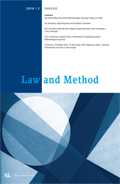|
A detailed description is offered of the debate concerning the question how – within the framework of a normative research question – relevant and operational test criteria can be formulated. |


Law and Method
About this journalSubscribe to the email alerts for this journal here to receive notifications when a new issue is at your disposal.
| Diversen |
|
| Authors | Carel Smith |
| Author's information |
| Artikel |
|
| Keywords | juridisch promotieonderzoek, probleemstelling, toetsingscriteria, aard van de rechtswetenschap |
| Authors | Lisanne Groen |
| AbstractAuthor's information |
| Artikel |
|
| Keywords | legal doctrine as a science, non-normative discipline, norm-descriptions, norm-contentions, norm-recommendations, Aarnio and Niiniluoto |
| Authors | Anne Ruth Mackor |
| AbstractAuthor's information |
|
In this article, the author argues that legal doctrine is not more normative than other scientific disciplines. This argumentation is built on the claim that the distinction between descriptive and normative statements is too simple to analyze the nature of legal doctrine. In the author’s view, a more detailed analysis of legal statements helps to achieve a better and more accurate characterization of legal doctrine as a science. For this purpose, the author builds on the distinction of Aarnio and Niiniluoto between norm-descriptions, norm-contentions and norm-recommendations. She argues that legal doctrine consists mainly of empirical and non-empirical norm-descriptions and that it can therefore be considered as a non-normative discipline. |
| Artikel |
|
| Keywords | rechterlijke oordeelsvorming, opleiding, socialisatie, omgevingsinvloed |
| Authors | Maarten van Wel |
| AbstractAuthor's information |
|
In this paper the author attempts to answer the intriguing question how judges think by providing a description of the context of judicial decision-making from the insider’s perspective of a judge trainee. This paper demonstrates that in judicial training socialization plays an important formative role. Looking at a standard model for judging civil cases the author stresses that judicial decisions are essentially arbitrary in the true sense of the word and can only be understood from within the legal system. What makes judicial decisions special is not the argumentative method, but their status. One way the judicial power of decision is restricted is by the membership of judges of a professional group with a shared culture and tradition. The author is under the impression that the influence of this context of judicial decision-making on judging is underexposed in legal studies. This paper tries to give the initial impetus to a further exploration. |
| Artikel |
|
| Keywords | epistemology (‘scientific’ versus ‘critical’), rape in criminal law, normative classification, empirical evidence |
| Authors | Nicolle Zeegers |
| AbstractAuthor's information |
|
This article answers the question of why and in what respects a ‘critical epistemology’, compared to a ‘scientific epistemology’, offers the better alternative for criminal law investigations into rape. By resuming the recent debate concerning the importance of scientific truth in criminal law investigations the author shows that this debate overlooks the cultural values that are necessarily involved in many criminal law cases. Such involvement of cultural values will be illustrated with a historical overview of law cases concerning rape in the context of a heterosexual relationship. Whereas value-free knowledge is the ideal strived for by a ‘scientific epistemology’, the basic idea of a critical epistemology is that knowledge is theory dependent and not free of values. Therefore this epistemology offers the best guarantees for acknowledging the values that are necessarily involved in many criminal law inquiries. |
| Boekbespreking |
|
| Authors | Rob van Gestel |
| Author's information |
| Boekbespreking |
|
| Authors | Pauline Westerman |
| Author's information |

 Issue 2
Issue 2